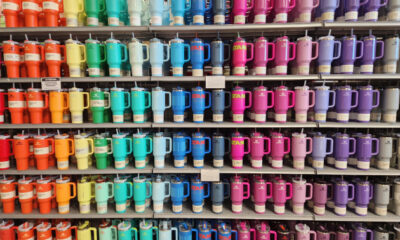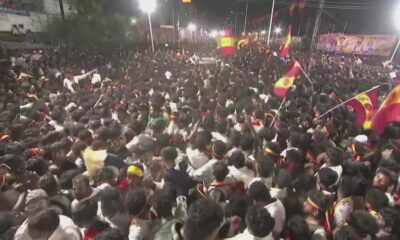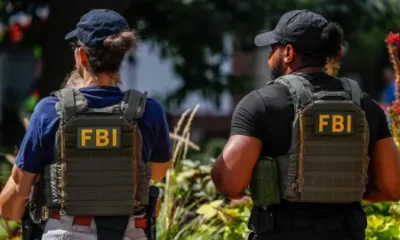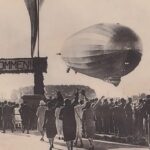Other News
Thousands of Germans in Berlin protest, call for end to Israel-Hamas war in Gaza
Read more on post.
By Euronews
Published on
27/09/2025 – 21:28 GMT+2

ADVERTISEMENT
Tens of thousands of protesters took to the streets of Berlin, the German capital, on Saturday in solidarity with Palestinians in Gaza, calling for an end to the Israel-Hamas war in the war-devastated enclave.
Demonstrators shouted slogans like “free, free Palestine,” and demanded an end to the worsening humanitarian crisis in Gaza.
Some 50,000 people took part in the march through Berlin’s downtown area, according to police. About 1,800 law enforcement officers were deployed to monitor the demonstrators.
The protesters also called for a halt to German arms exports to Israel and demanded European Union sanctions against Israel, German news agency dpa reported.
Germany is one of Israel’s leading foreign suppliers of military hardware, along with the US and Italy. In August, Berlin halted military exports to Israel for use in Gaza amid outcry over Netanyahu’s plan for a renewed offensive, which Israel has since begun.
Protests in Berlin on Saturday reportedly began from Alexanderplatz, with demonstrators marching to the Victory Column in the Tiergarten district of Berlin.
Around 50 organisations and associations had called for the demonstration, including Amnesty International and the party Die Linke. One of the protests, a pro-Palestine demonstration in Kreuzberg, was, however, broken up due to anti-Israel slogans.
In a separate protest, about 100 people rallied in favour of Israel and “against all forms of antisemitism,” German public broadcaster RBB reported, adding that there were isolated scuffles when the two protest groups met. It wasn’t immediately clear if the scuffles were between the different protesters or with police trying to separate them.
Protests took place simultaneously in other EU cities
Several thousand people also protested in the western German city of Düsseldorf under the slogan “we will not forget Gaza — freedom for Palestine and all oppressed peoples.”
In Geneva, about 6,000 people demonstrated for an end to the war in Gaza, Swiss public broadcaster SRF reported. Other European cities have also seen Gaza protests in recent weeks.
The war in Gaza was triggered by the Hamas-led attack on southern Israel on Oct. 7, 2023. In the attack, militants killed around 1,200 people, mostly civilians, and abducted 251. There are still 48 hostages remaining in Gaza, of whom Israel believes 20 are still alive.
Israel’s retaliatory offensive over the past 23 months has killed more than 65,100 people in Gaza, according to local health officials, which does not distinguish between civilians and Hamas fighters.
Germany has led efforts among the EU’s 27 member nations to block collective criticism of or efforts to stop Israel’s blockade of Gaza and military campaign, but the German government has recently shown some scepticism about its position.
The German government remains deeply concerned about the suffering of civilians in Gaza, Merz said in August when he spoke against Israel’s planned offensive in Gaza.
Other News
Pedestrian hit by SUV in Monaghan three weeks ago dies in hospital
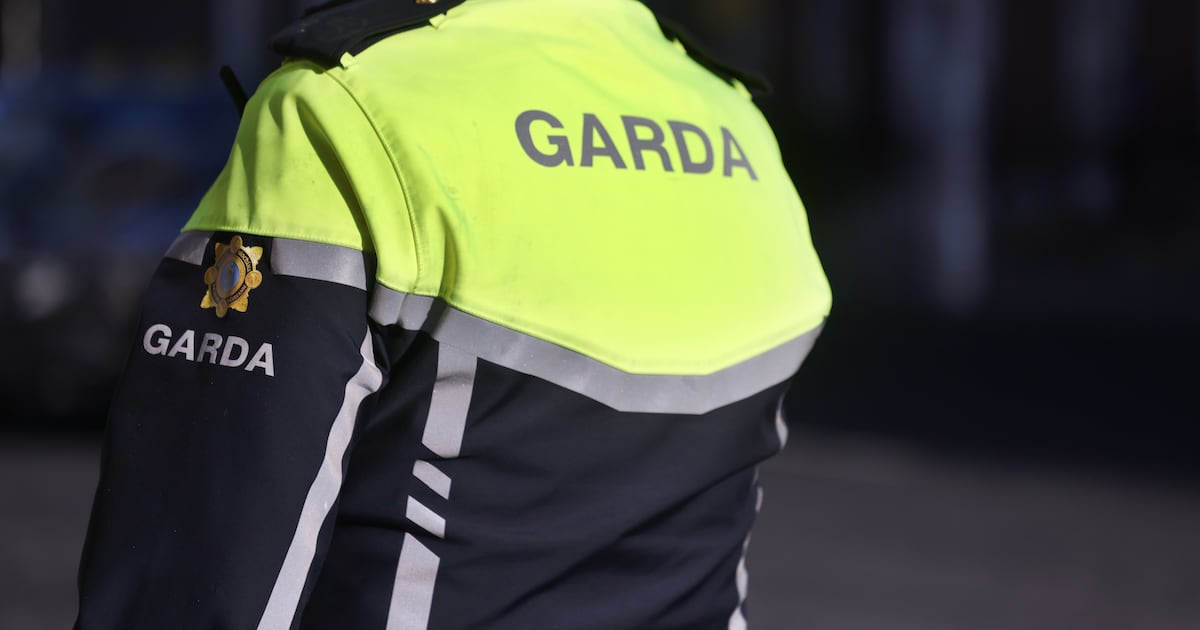
Read more on post.
A pedestrian seriously injured in a collision three weeks ago has died in hospital.
The road traffic collision with an SUV occurred on Broad Road, Monaghan in the early hours of Saturday, September 6th.
The 47-year-old man was brought to Our Lady of Lourdes hospital in Drogheda.
The local coroner has been notified.
Gardaí continue to investigate the circumstances of the collision and are appealing to anyone who may have witnessed the incident to come forward. Road users who were in the area at the time and may have camera footage (including dashcam) are asked to make it available to the investigation.
Anyone with information is asked to contact Monaghan Garda station on 047 77 200, the Garda Confidential Line on 1800 666 111, or any Garda station.
Breaking News
From RAF engineers to plumbers: The working lives behind England’s rugby world cup final stars

Read more on post.
-
26 September 2025
Hooker Amy Cokayne is one of the few England World Cup winners to still have a day job since professionalism came into the women’s game six years ago.
Victory over Canada came in the 29-year-old’s third successive final, but alongside her rugby career she is also a police officer in the RAF.
The RAF’s Elite Athlete Scheme allowed Cokayne to focus on her dream of lifting the World Cup while maintaining her military career in the background.
The Flight Lieutenant kept the Canada pack in check at Twickenham, but will at some point returning to her role of keeping pilots in order.
“I’ve never arrested anyone,” she told BBC Radio 5 Live’s Barely Rugby podcast.
“I’ve done all my training, but I can’t imagine I will – I’m an officer, so I imagine I’ll just send someone.”
Cokayne, who comes from a military family, entered the RAF in 2017, after England lost the World Cup final, and even gave up rugby for a year.
“After the World Cup loss, I felt I needed something outside of rugby, to figure out a career,” she told ESPN.
“I think this has actually helped my rugby career, having that time away and realising I still love the sport. I still have that career to go back to when I hang up my boots.
“I’m really fortunate the air force support me to do rugby full time through the elite athletes scheme – but I try to help out where I can.”
To play this video you need to enable JavaScript in your browser.
This video can not be played
It is a very different scenario now to when England last won the World Cup in 2014, where an entirely amateur side beat Canada in Dublin before going back to their daily lives shortly after.
Captain Katy Daley-McLean was a primary school teacher in Sunderland, while vice-captain Sarah Hunter was a university rugby development officer for the RFU.
Veteran back row Marlie Packer was part of the 2014 winning squad, where a week after lifting the trophy she was back at her job as a plumber – having had to take seven weeks of unpaid leave to prepare for and play in the World Cup.
“The customers I’ve been able to tell about it, they have been overwhelmed to see the medal and stuff – it’s really cool,” she told BBC News in 2014, while fixing a toilet.
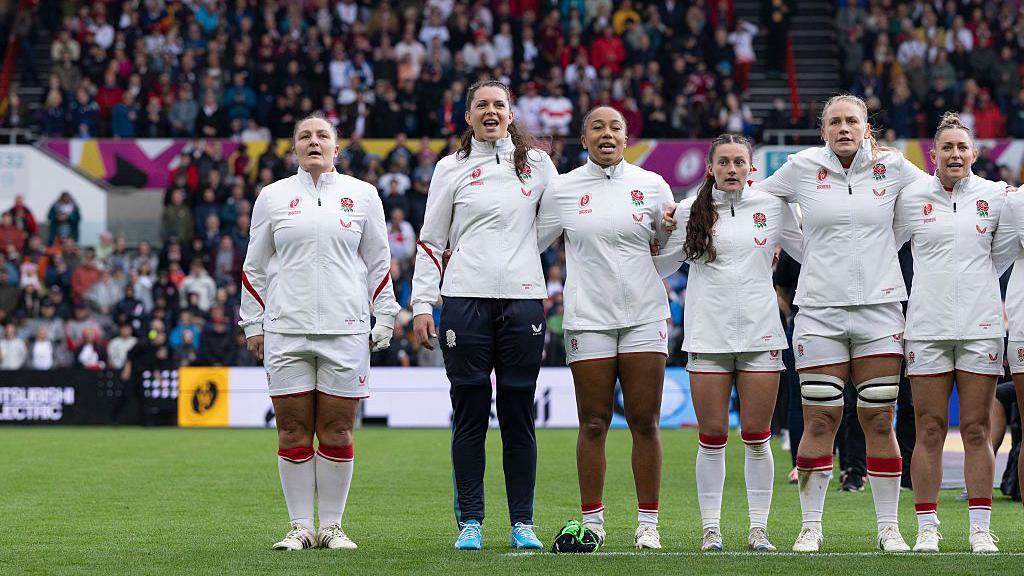 Getty Images
Getty Images‘I absolutely loved teaching’
At the time, Packer said she was hopeful of one day being able to play rugby professionally for a couple of years before going back to plumbing. But given the change in landscape for women’s rugby in England over the past decade, she may never have to put down the rugby ball and pick up the wrench again.
“At the moment I’m doing my level three coaching award. I’ve had my level two for years,” she told BBC Radio Somerset in May.
“I think the sport has given me so much – not just to the person I am today but I’ve travelled the world, I’ve got friends all over the world.”
England are one of the very few fully professional nations in women’s rugby, which has played a part in making them number one in the world rankings.
Canada, despite being number two in the world and having several players in the professional Premier Women’s Rugby in England, launched a crowdfunding campaign to boost their chances of competing against the bigger nations.
 Getty Images
Getty ImagesBut while the top of the English game is able to properly support professional athletes, many of the stars who lined up at Twickenham had to find other ways to support themselves before reaching that level.
Front row stalwart Lark Atkin-Davies was a primary school teacher before she played rugby professionally.
“It’s nice to reflect sometimes and see the journey that you’ve been on,” she said.
“It’s not always been smooth sailing for me and I think there were some difficult times but obviously being professional for the last six years, I absolutely love it.
“Hand on heart, I couldn’t ask for a better job. I absolutely loved teaching and the children, but I still get those moments now when I interact with the children that come and watch the games.”
‘I thought I would be an Amazon driver for the rest of my life’
 Getty Images
Getty ImagesAnother member of England’s pack, Hannah Botterman, nearly took a very different path before professional rugby arrived.
“I was a painter and decorator, proper van life,” she told the Barely Rugby podcast. “I was an apprentice for one of my mum’s friends. I was working from 7am until 4pm, then I’d do a night shift at the Harvester.
“The plan with the painting and decorating was that I would take the business on while the woman I worked for would have a baby. But then I got a contract from England and sacked it off, just as I was good enough to do it myself.”
Even the young, modern stars of women’s rugby felt the pinch of a working life when the coronavirus pandemic hit. Several players were made redundant during covid – while the RFU kept the XVs squad on furlough, those on sevens contracts were not.
Meg Jones’ speed, strength, industry and ability to be in the right place at the right time have made her arguably the best player at this World Cup.
But during Covid lockdown, she was contemplating a future working for Amazon.
“Toilet breaks are not really a thing. You’re in at 5am and then you probably leave about 4pm without having to wee,” said Jones, who by then had already been to a Rugby World Cup final. She had started the 2017 defeat by New Zealand at outside centre.
“It was scary. I’d never had another job in my life and suddenly my livelihood had gone. I just thought I was going to be an Amazon delivery driver for the rest of my life.”
On Saturday, Jones and co delivered a first World Cup title on home soil for England.
They all know just how hard they had to work for that achievement, on and off the field.
Related topics
Other News
Thousands left without power in Zaporizhzhia as Russian drone attacks cause damage
Read more on post.

ADVERTISEMENT
Russian attacks in Zaporizhzhia on Saturday left around 9,000 households without electricity, though by morning, energy crews had managed to restore almost all power, local officials in the Ukrainian city said.
According to the Zaporizhzhia Regional Military Administration, a store, ten retail outlets, two apartment buildings, and several non-residential premises were damaged in the drone attacks.
Destruction also affected a site near the bus station, which had already been hit on 10 August by guided bombs. At that time, 80% of the building was destroyed.
Its windows were boarded up with OSB sheets, on which a local artist had painted a mural. After the latest nighttime strike, the artwork was also damaged.
On Saturday morning, employees at one of the hardest-hit sites near the bus station were carrying out dozens of boxes with food, drinks, and other goods.
Some reported that a Russian Shahed drone struck the building overnnight, when staff were conducting inventory.
One of the employees, Volodymyr, said that after hearing the first explosion, they ran to a modular shelter, claiming that this quick reaction saved their lives.
Nearby, kiosk worker Hanna was clearing broken glass and twisted metal. She noted that this neighbourhood had already been shelled once before.
Fourth day of blackout at Zaporizhia nuclear plant
Saturday’s attacks came as Ukraine’s Zaporizhzhia nuclear plant has been off-grid for four consecutive days, its longest blackout to date.
Blackouts at the plant have been frequent since Russia seized the Zaporizhzhia plant in 2022, due to its proximity to the front line, but experts are warning that the current blackout heightens the risk of a malfunction.
The Zaporizhzhia nuclear power plant in the middle of the fighting in Ukraine was temporarily knocked offline Thursday because of fire damage to a transmission line, causing a blackout across the region and heightening fears of a catastrophe in a country still haunted by the Chernobyl disaster.
The complex, Europe’s largest nuclear plant, has been occupied by Russian forces and run by Ukrainian workers since the early days of the 6-month-old war.
Ukraine alleges Russia is essentially holding the plant hostage, storing weapons there, and launching attacks from around it, while Moscow accuses Ukraine of recklessly firing on the facility.
The plant’s emergency backup diesel generators had to be turned on in order to provide the electricity required to operate the plant, according to Ukrainian President Volodymyr Zelenskyy, who blamed Russia’s relentless attacks.
-
Politics4 days ago
European Parliament snubs Orbán with vote to shield Italian MEP from Hungarian arrest
-
Culture3 weeks ago
Life, loss, fame & family – the IFI Documentary Festival in focus
-
Culture2 months ago
Fatal, flashy and indecent – the movies of Adrian Lyne revisited
-
Environment1 week ago
Key oceans treaty crosses threshold to come into force
-
Health5 days ago
EU renews support for WHO’s Universal Health Coverage Partnership
-
Culture1 week ago
Farewell, Sundance – how Robert Redford changed cinema forever
-
Culture5 days ago
Twilight at 20: the many afterlives of Stephenie Meyer’s vampires
-
Culture4 weeks ago
What is KPop Demon Hunters, and why is everyone talking about it?






